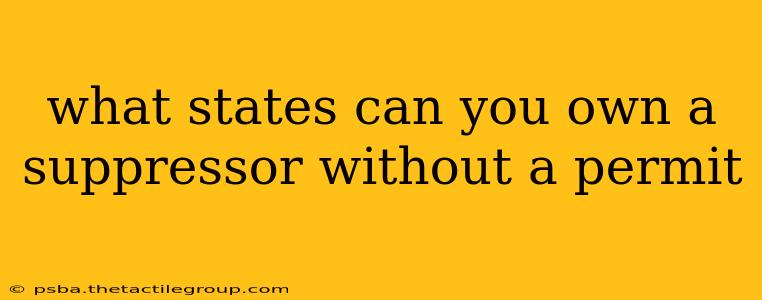The question of suppressor ownership without a permit is complex and hinges on federal regulations alongside individual state laws. While no state allows completely unrestricted ownership of suppressors, some have less stringent regulations than others. It's crucial to understand that owning a suppressor always involves federal requirements, even in states with more permissive laws. This information is for educational purposes only and should not be considered legal advice. Always consult with a qualified legal professional and your state's Bureau of Alcohol, Tobacco, Firearms and Explosives (ATF) field office before purchasing or possessing a suppressor.
The Federal Landscape: The National Firearms Act (NFA)
The foundation of suppressor regulation lies in the National Firearms Act (NFA) of 1934. This federal law mandates that all suppressors must be registered with the ATF and requires a thorough background check before purchase. This federal requirement applies nationwide; no state can legally circumvent it. Therefore, the idea of completely "permit-less" ownership is inaccurate.
What varies between states is the process of obtaining the required ATF registration. Some states streamline this process, while others add additional layers of regulation.
States with More Relaxed Suppressor Regulations (Relative to Others)
Several states have adopted policies that simplify the process of registering a suppressor with the ATF, though they don't eliminate the federal requirements. These states generally don't impose additional state-level permits or licensing beyond what the federal government mandates. However, this is a constantly evolving area, and state laws change. It's critical to check your state's specific laws and regulations directly through official channels.
Examples of states sometimes cited for less restrictive suppressor laws (but always double-check):
- Arizona: Arizona is frequently mentioned among states with simpler suppressor acquisition processes, however, it still adheres to the federal NFA rules.
- Kansas: Similar to Arizona, Kansas has regulations that align with the federal process, often requiring only the federal ATF registration.
- Mississippi: Mississippi often appears on lists of states with less stringent regulations compared to others. However, it is essential to review current Mississippi state and federal laws.
- Texas: Texas generally aligns with federal regulations, but state-specific information is vital to confirm the current regulations.
States with More Restrictive Suppressor Regulations
Many states impose additional state-level permits or licensing requirements on top of the federal NFA process, making suppressor acquisition more complicated. These requirements can vary significantly, so understanding your specific state’s rules is vital.
The Importance of Due Diligence
This information is not exhaustive and should not be interpreted as legal advice. State laws regarding firearm accessories, including suppressors, are subject to change and often involve nuanced interpretations. Before taking any action regarding suppressor ownership, take these steps:
- Consult the ATF website: The ATF's official website provides the most up-to-date and accurate information on federal regulations.
- Check your state's Attorney General's website: State websites usually contain comprehensive information on state-specific firearm laws.
- Seek legal counsel: Consult a qualified attorney specializing in firearm law in your state for personalized advice.
Understanding the legal landscape surrounding suppressor ownership requires meticulous research and professional guidance. Failure to comply with both federal and state regulations can result in serious legal consequences. Remember, responsible firearm ownership necessitates a thorough understanding of all applicable laws.

